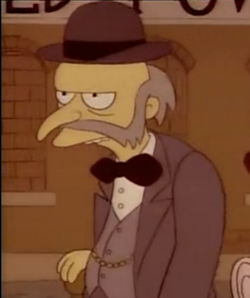(Tags: mobile edit, mobile web edit) |
|
| Line 16: |
Line 16: |
| | == History == | | == History == |
| | [[File:Colburns.jpg|thumb|left|A younger Colonel Burns as a plantation owner]] | | [[File:Colburns.jpg|thumb|left|A younger Colonel Burns as a plantation owner]] |
| − | A racist, villainous man, he owned a large plantation in the 1860s and owned a slave named [[Virgil]] who is directly related to Homer Simpson and his family. Due to the extremely long lifespans of members of the Burns family, it is quite plausible that around the time of Charles Burns' childhood, Wainwright was the same [[Charles Montgomery Burns' adoptive father|mysterious figure]] (loveless, twisted billionaire, as said by Charles’ father) who lured Charles away from his loving parents to adopt as his own son, intending to corrupt the young boy to be like himself: caring only about greed and power. (Before this time, it seems, young Charles was so lighthearted and pleasant that his parents even gave him the pet-name "Happy.") It has been referenced that Wainwright directly destroyed Charles Montgomery's innocence (it may even have been Wainwright who gave Charles his own middle name "Montgomery" in the first place). | + | A racist, villainous man, he owned a large plantation in the 1860s and owned a slave named [[Virgil]] who is directly related to Homer Simpson and his family. Due to the extremely long lifespans of members of the Burns family, it is quite plausible that around the time of Charles Burns' childhood, Wainwright was the same [[Charles Montgomery Burns' adoptive father|mysterious figure]] who lured Charles away from his loving parents to adopt as his own son, intending to corrupt the young boy to be like himself: caring only about greed and power. (Before this time, it seems, young Charles was so lighthearted and pleasant that his parents even gave him the pet-name "Happy.") It has been referenced that Wainwright directly destroyed Charles Montgomery's innocence (it may even have been Wainwright who gave Charles his own middle name "Montgomery" in the first place). |
| | | | |
| | A unkind grandfather of Charles, presumably Wainwright, appeared in Mr. Burns' flashback,<ref>"[[Last Exit to Springfield]]"</ref> portrayed as menacing, powerful and mean-spirited toward the working class. Charles Montgomery Burns refers to "Colonel Burns" as his father; he is presumably referring to his adoptive father, Wainwright, who is actually, by blood, his grandfather.<ref name=THECOLORYELLOW></ref> | | A unkind grandfather of Charles, presumably Wainwright, appeared in Mr. Burns' flashback,<ref>"[[Last Exit to Springfield]]"</ref> portrayed as menacing, powerful and mean-spirited toward the working class. Charles Montgomery Burns refers to "Colonel Burns" as his father; he is presumably referring to his adoptive father, Wainwright, who is actually, by blood, his grandfather.<ref name=THECOLORYELLOW></ref> |
A racist, villainous man, he owned a large plantation in the 1860s and owned a slave named Virgil who is directly related to Homer Simpson and his family. Due to the extremely long lifespans of members of the Burns family, it is quite plausible that around the time of Charles Burns' childhood, Wainwright was the same mysterious figure who lured Charles away from his loving parents to adopt as his own son, intending to corrupt the young boy to be like himself: caring only about greed and power. (Before this time, it seems, young Charles was so lighthearted and pleasant that his parents even gave him the pet-name "Happy.") It has been referenced that Wainwright directly destroyed Charles Montgomery's innocence (it may even have been Wainwright who gave Charles his own middle name "Montgomery" in the first place).
A unkind grandfather of Charles, presumably Wainwright, appeared in Mr. Burns' flashback,[2] portrayed as menacing, powerful and mean-spirited toward the working class. Charles Montgomery Burns refers to "Colonel Burns" as his father; he is presumably referring to his adoptive father, Wainwright, who is actually, by blood, his grandfather.[1]

 Episode – "Last Exit to Springfield"
Episode – "Last Exit to Springfield"  Episode – "The Color Yellow"
Episode – "The Color Yellow"  Comic story – Now Museum, Now You Don't!
Comic story – Now Museum, Now You Don't!  Book – The Simpsons Uncensored Family Album
Book – The Simpsons Uncensored Family Album  Book – C. Montgomery Burns' Handbook of World Domination
Book – C. Montgomery Burns' Handbook of World Domination 
